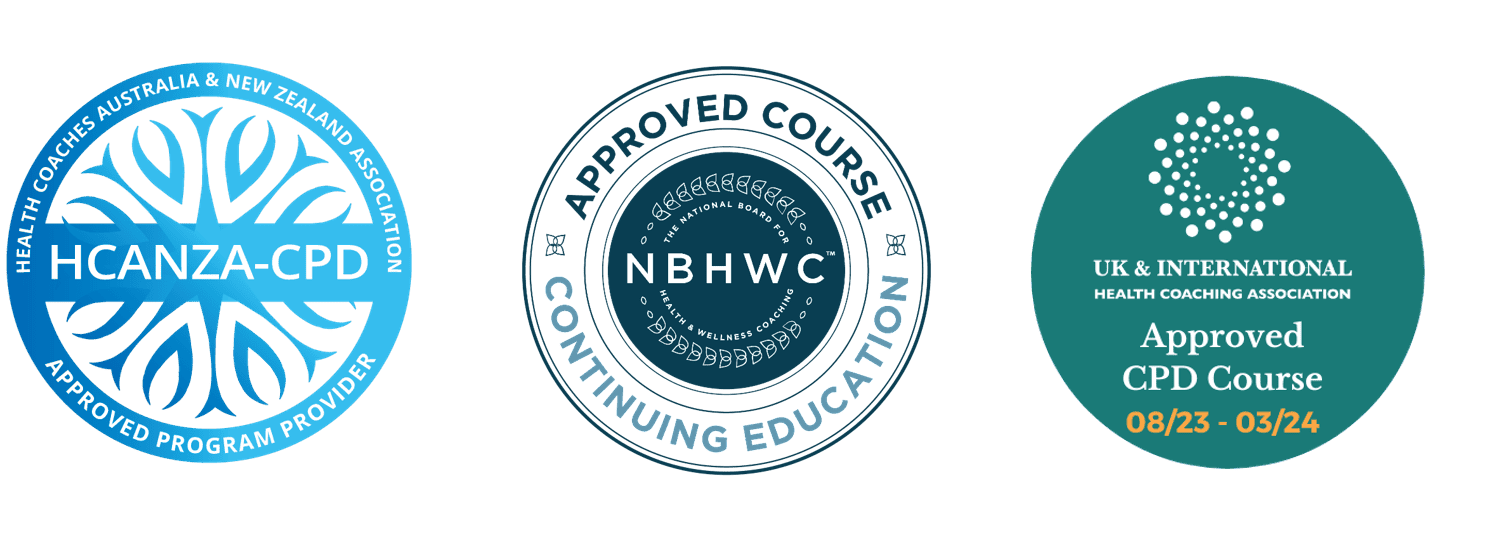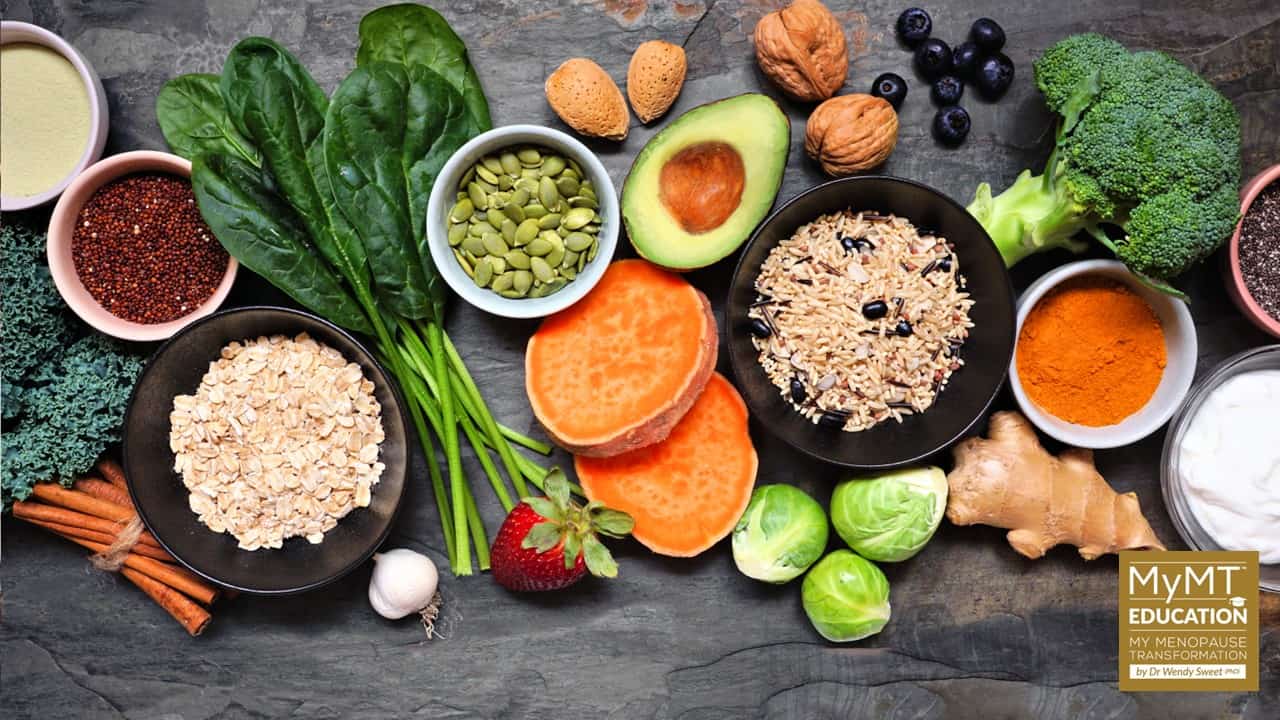Many women become reliant on various supplements and medications to help their menopause symptoms and/or weight gain, and there is nothing wrong with this of course, but how many also change aspects of their nutrition to accommodate the transition through menopause?
I know this, because I was the same. Whilst seeking the quick-fix menopause supplements and HRT solutions, I didn’t understand that nutritional lifestyle solutions were becoming well evidenced for symptom management, until I did my doctoral studies on health and mid-life women.
Scientists have discovered thousands of substances in foods that go way beyond relying on ‘just’ supplements.
Nutritional choices play an important role in reducing symptoms and according to the authors below, it’s ‘essential’ to change food choices when women arrive in midlife.
‘Among the various aspects of health promotion and lifestyle adaptation to the menopause and postmenopausal period, nutritional habits are essential because they concern all women, can be modified, and impact both longevity and quality of life.’ (Silva, Opperman et al, 2021).
Positioning the menopause transition in ageing research opened the door to a variety of symptom management possibilities using food as medicine, not only for myself, but now for the thousands of women who join me on my programmes and in my coaching community.
There’s an element of surprise when this happens.
All roads in women’s health and ageing research lead to the Mediterranean Dietary approach. It’s this approach I’ve taken and adapted to the specific nutrients that help to reduce symptoms and weight during the menopause transition.
Part of this approach is ensuring that women are having the appropriate nutrients that fight inflammatory changes that begin to arrive in peri-menopause.
For example, if women are feeling hot and sweating profusely, then this is a sign that their temperature regulation is out of balance.
When this happens, the body is trying to cool down by moving heat to the surface of the skin. Heat generation becomes worse as women move through menopause, because blood vessels lose some elasticity. This is called vascular stiffness.
This is where foods high in nitrates are potentially, cooling foods for women. They help to dilate blood vessels and reduce the rate of vascular stiffness.
Dietary nitrate has been demonstrated to have a range of beneficial vascular effects, including reducing blood pressure, inhibiting platelet clumping and clotting, and preserving or improving endothelial dysfunction, enhancing exercise performance in healthy individuals and patients with peripheral arterial disease. (Lidder & Webb, 2012).
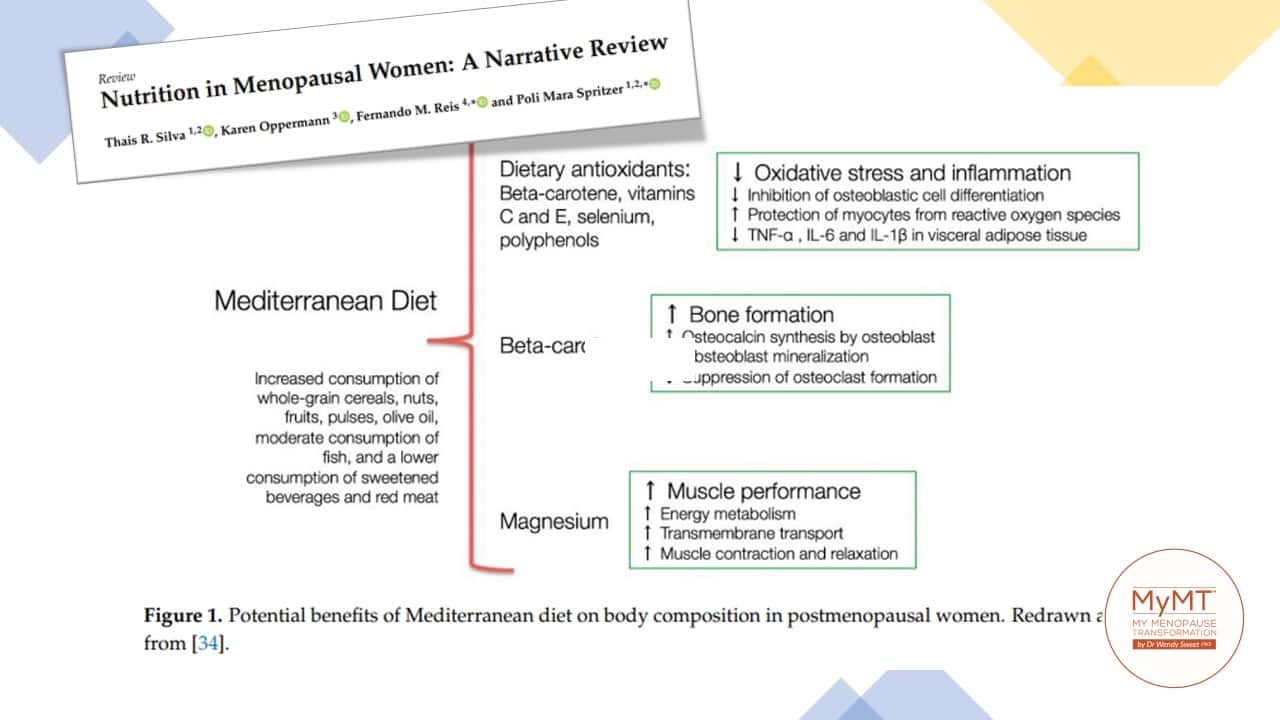
Nutrition and post-menopause health:
It is well known in metabolic and cardiac research that the menopause transition and subsequent endocrine or hormonal changes, are associated with increased prevalence of metabolic syndrome, cardiovascular disease, obesity, osteoporosis and immune dysfunction.
Looking at these clinical end-points is important, because it helps us to explore prevention opportunities according to the lifestyle and ageing research.
For example, when exploring the nutritional research on post-menopause weight gain, dietary intake and fat mass, there is clear evidence that dietary plant carbohydrates that have a low rating on the Glycemic Index rating system (below 55), and whole grains (instead of refined grains), have positive effects on our resting metabolic rate (Silva et al, 2021).
Yet many popular diets these days remove wholegrains, (and yes, some women are gluten intolerant). But cardiac health research shows that wholegrains help to steady blood glucose response and give lasting energy as well as reducing harmful LDL-cholesterol. Whole-grains are also important for reducing palpitations and protecting the cardiovascular system as women age. [NZHF Wholegrains and the Heart Evidence Paper, 2018]
From our early-50’s onwards, as menopause progresses, our cardiac muscle changes in structure and function, as do our skeletal muscles. And it doesn’t matter if women are regular exercisers or not, their ageing heart and muscles need the nutrients that matter to them to help their cardiac health as they age. Some of these nutrients come from wholegrains.
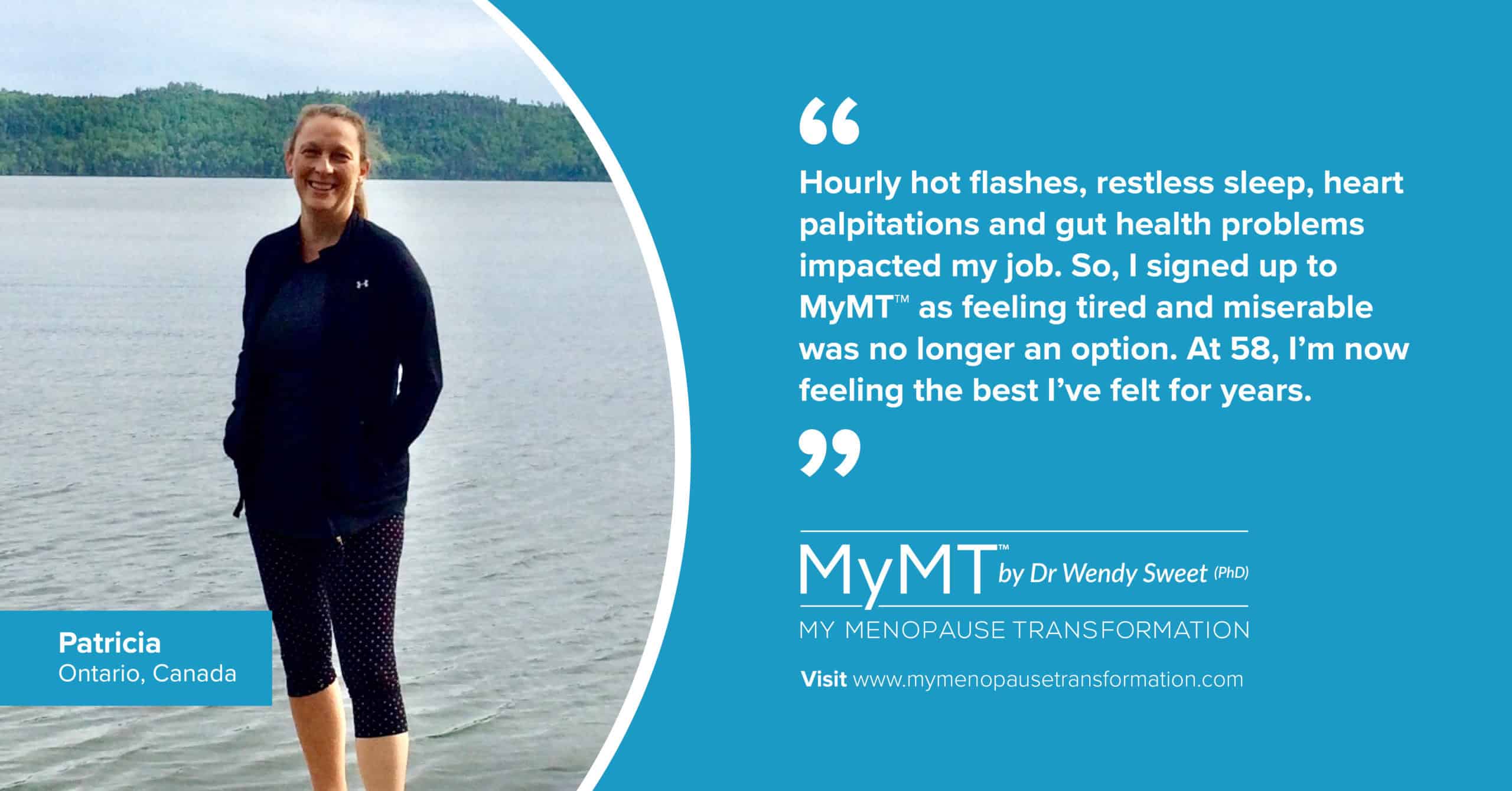
Helping your clients to adjust their nutrition is a major modifiable risk factor that you can support them with. For midlife women, this means the consideration of heart disease and osteoporosis prevention, as well as weight management – the main conditions that beset western women as they age.
Many women in midlife follow a diet high in fat and protein such, as these types of diets are popular, however, a high-fat diet isn’t recommended, especially for women already overweight and oestrogen dominant. (Silva et al, 2021).
I can’t reinforce this enough and have written about the detrimental effects of diets high in both fats and animal protein and the load that these are known to place on ageing kidneys. This is known as PRAL, or Potential Renal Acid Load.
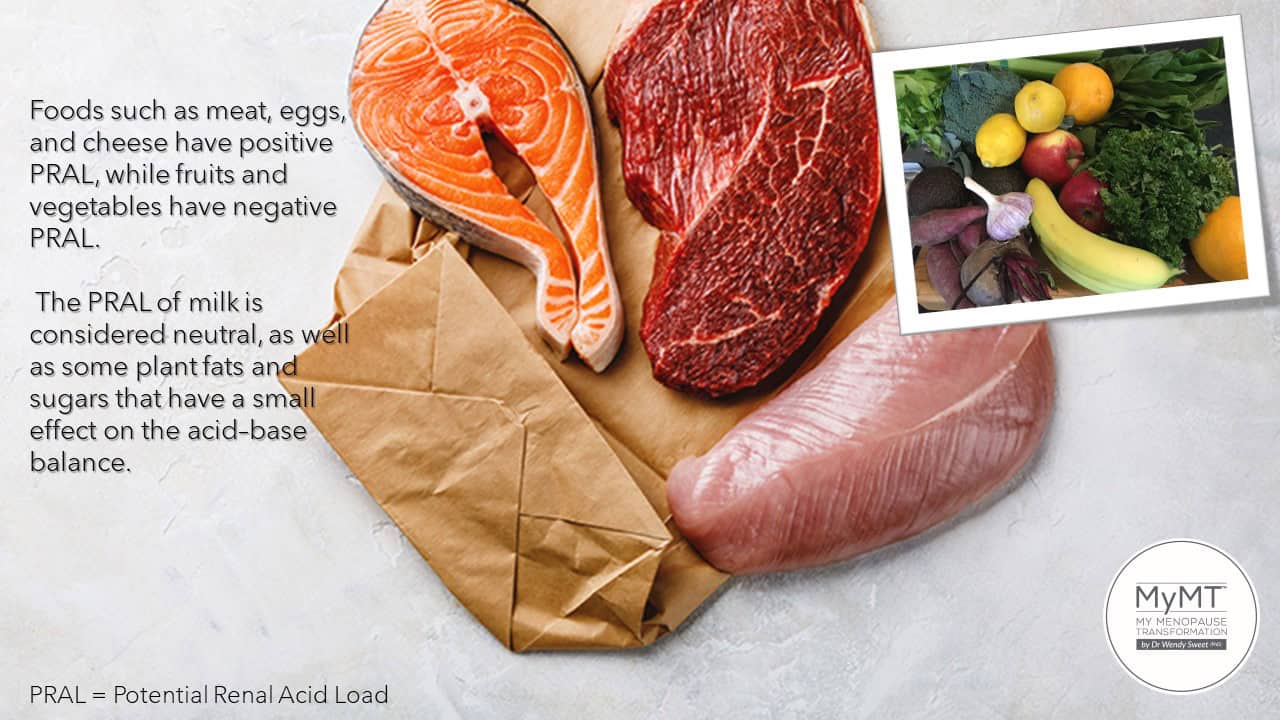
When it comes to looking ahead to a potentially healthy ageing, then I’m a great advocate of using the menopause transition to begin to try new approaches.
The lifestyle and disease-prevention science specific to women allows a framework from which to make these adjustments. Most advice follows learnings from cardiovascular research as well as ageing and longevity research including:
- Protein sourced from plants, nuts, seeds, legumes, fish and salmon.
- Fats from unsaturated plant sources or alternative sources of Omega-3 fatty acids and olive oil.
- Carbohydrates from whole-grains and starch vegetables
- A minimum of 5 servings of fruits and vegetables per day (and up to 10) but not sugar-sweetened beverages.
- Small to moderate amounts of Dairy foods.
[Silva, Oppermann et al, 2021).
It makes sense to support women into lifestyle change in midlife and nutritional changes are one way of doing this. For those of you who are unsure about what specific changes to help your clients make for symptom management, then please explore the CPD Health Practitioner Course – this is where I go into the specifics of ‘food as medicine for midlife clients’ with you.
The discovery of phyto-nutrients has changed everything we know about foods.
This term refers to the compounds in foods that contain an abundance of microscopic healing substances. Some scientists call them the ‘vitamins of tomorrow’ such is their power to heal.
Many pharmaceutical companies are using these phyto-chemicals in plant-derived hormone therapies for women and as I examine many of the ingredients of menopause supplements, then they too have a variety of phyto-nutrients in them, especially B-vitamins which are known to reduce hot flushes in women.
Another example is apples. How many of you were told to eat apples when you were younger? Not only to improve chewing, which helps to reduce dizziness and improve balance in women, because it helps to clear the ear canal), but also to improve your lung health.
If your clients have had long-covid then this is an important food for them to eat. Apples contain quercetin, which is strong enough to improve the inflammatory changes in lungs and to reduce the risk of heart disease as you age.
Most importantly, apples (and tomatoes) are evidenced to help women detoxify their liver – an important part of weight management as they move through menopause and into post-menopause. I cover this in the MyMT Menopause Weight Loss Coach Course.
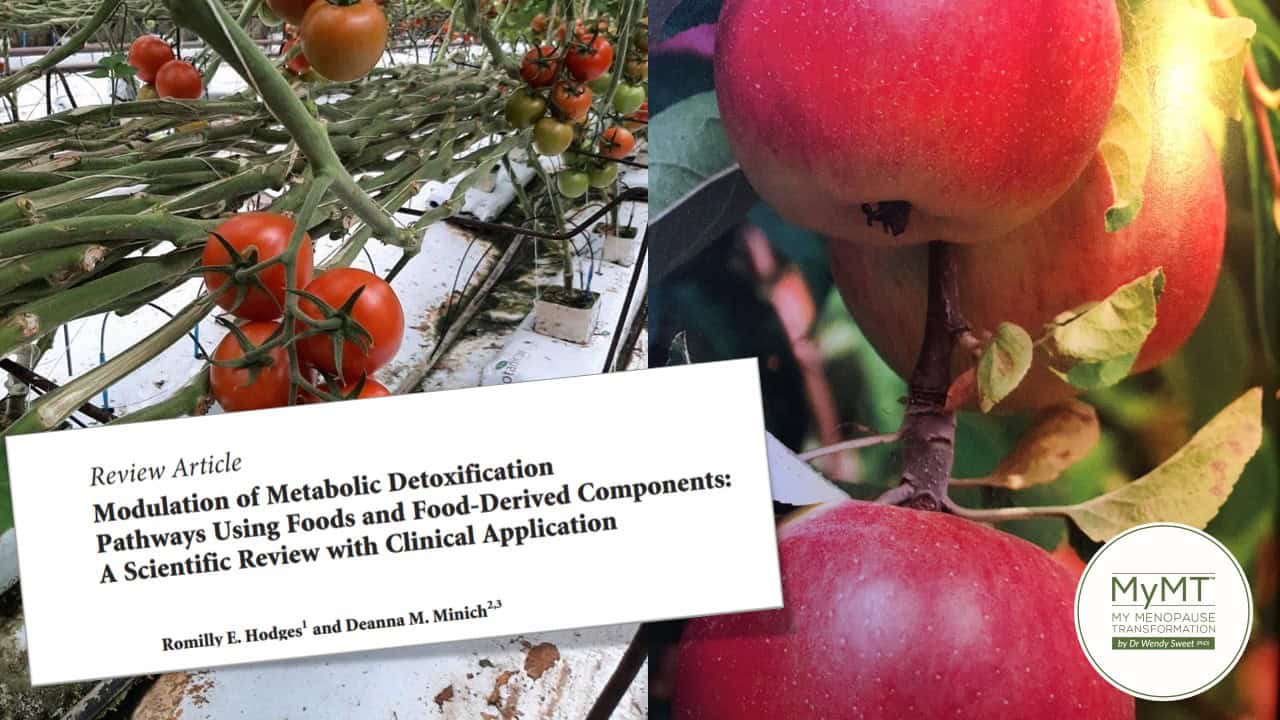
As the year gets underway and will undoubtedly be a busy one for you and your clients, I hope you can help them to understand that food is at the heart of their health as they move through menopause.
Wendy Sweet (PhD)/ My Menopause Transformation/ Member: Australasian Society of Lifestyle Medicine.
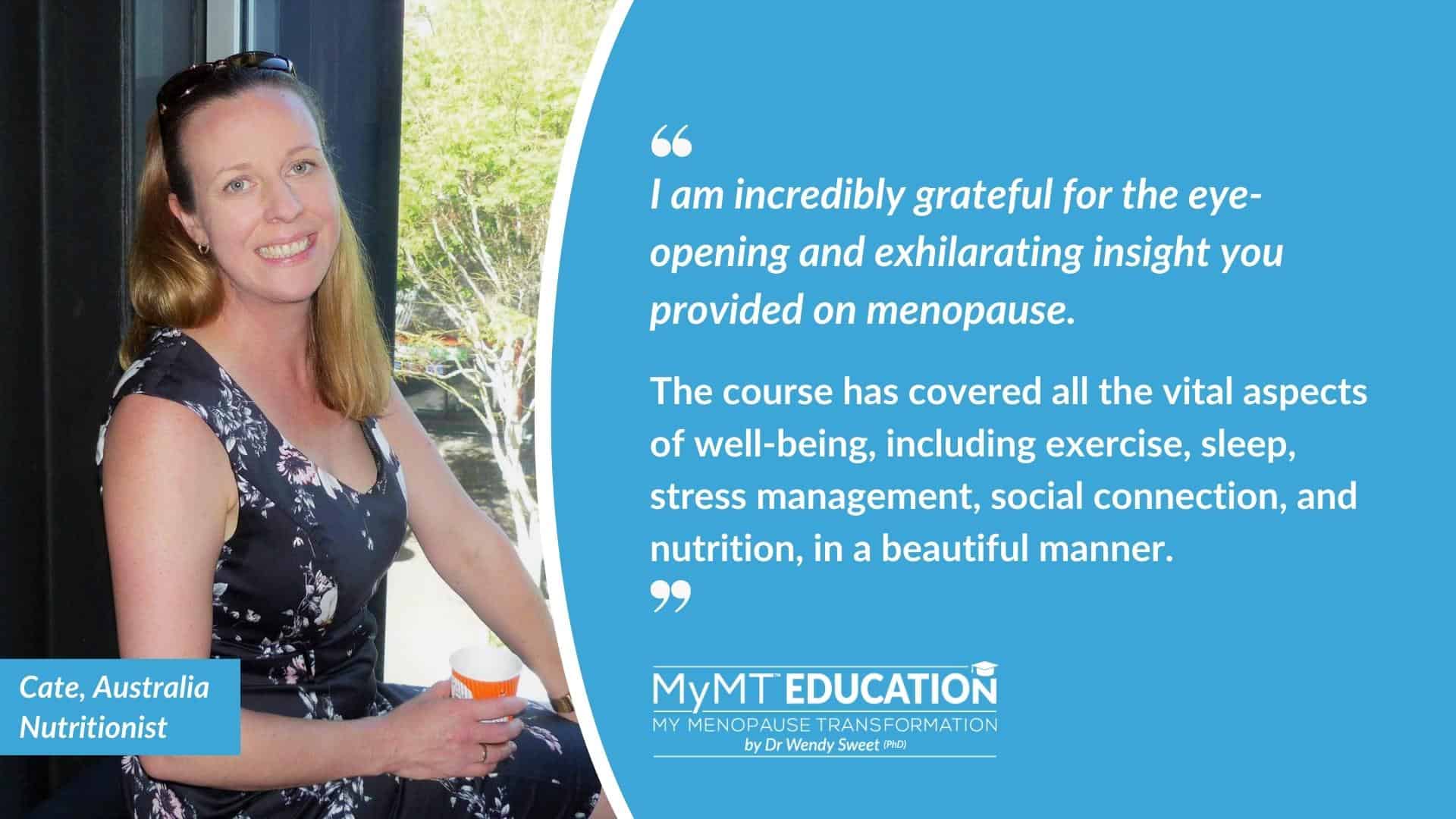
References:
Feskens EJM, Bailey R, Bhutta Z, Biesalski HK, Eicher-Miller H, Krämer K, Pan WH, Griffiths JC. Women’s health: optimal nutrition throughout the lifecycle. Eur J Nutr. 2022 Jun;61(Suppl 1):1-23.
Jin K. Modern Biological Theories of Aging. Aging Dis. 2010 Oct 1;1(2):72-74.
Lidder S, Webb AJ. (2013). Vascular effects of dietary nitrate (as found in green leafy vegetables and beetroot) via the nitrate-nitrite-nitric oxide pathway. Br J Clin Pharmacol. 75(3):677-96. doi: 10.1111/j.1365-2125.2012.04420.x. PMID: 22882425;
Preedy V. & Watson. R. (2020). The Mediterranean Diet: An evidence-based approach. 2nd Ed. Elselvier Academic Press: London, UK
Schwingshackl L, Morze J, Hoffmann G. (2020). Mediterranean diet and health status: Active ingredients and pharmacological mechanisms. Br J Pharmacol. Mar;177(6):1241-1257.
Silva, T., Oppermann, K, Reis, F. & Spritzer, P. (2021). Nutrition in Menopausal Women: A Narrative Review, Nutrients, 13, 2149, 1-14.
Yoshany, N., Mazloomy Mahmoodabad, S., Bahri, N., Moori, MK., & Hanna, F. (2020). Association between lifestyle and severity of menopausal symptoms in postmenopausal women. Electron J. Gen Med. 17(5): em22, 1-6.
